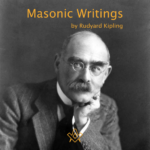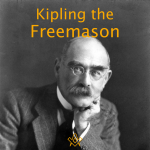When I was a King and a Mason, a Master Proven and skilled,
I cleared me ground for a Palace, such as a King should build.
I decreed and dug down to my levels presently, under the silt,
I came on the wreck of a Palace, such as a King had built.
There was no worth in the fashion there was no wit in the plan
Hither and thither, aimless, the ruined footings ran.
Masonry, brute, mishandled, but carven on every stone,
After me cometh a Builder tell him I, too, have known.
Swift to my use in my trenches, where my well-planned groundworks grew,
I tumbled his quoins and his ashlars, and cut and rest them anew.
Lime I milled of his marbles burned it, slaked it, and spread
Taking and leaving at pleasure the gifts of the humble dead.
Yet I despised not nor gloried, yet, as we wrenched them apart,
I read in the razed foundation the heart of that Builder’s heart.
As he has risen and pleaded, so did I understand
The form of the dream he had followed in the face of the thing he had planned.
When I was a King and a Mason, in the open noon of my pride,
They sent me a Word from the Darkness they whispered and called me aside.
They said, The end is forbidden. They said, Thy use is fulfilled.
Thy Palace shall stand as that other’s, the spoil of a King who shall build.
I called my men from my trenches, my quarries, my wharves, and my sheers
All I had wrought I abandoned to the faith of the faithless years.
Only I cut on the timber only I carved on the stone:
After me cometh a Builder tell him I, too, have known.
Recent Articles: by Kipling
 ‘ONCE in so often,’ King Solomon said, Watching his quarrymen drill the stone… |
 When I was a King and a Mason, a Master Proven and skilled, |
 Every man must be his own law in his own work, but it is a poor-spirited artist in any craft who does not know how the other man’s work should be done or could be improved. |
 Rudyard Kipling's deep connection with Freemasonry is evident in many of his poems and his stories |
 Kipling's In the Interests of the Brethren Short story by Rudyard Kipling |
 Kipling’s critics are quick to include him as one of the ‘fathers’ who ‘lied’ – echoing his short poem ‘Common Form’ – ‘If any question why we died, Tell them, because our fathers lied’. |
 Kipling's interest in Freemasonry is easily recognised in much of his work and examples are too numerous for one article. |
masonic knowledge
to be a better citizen of the world
share the square with two brothers

click image to open email app on mobile device









